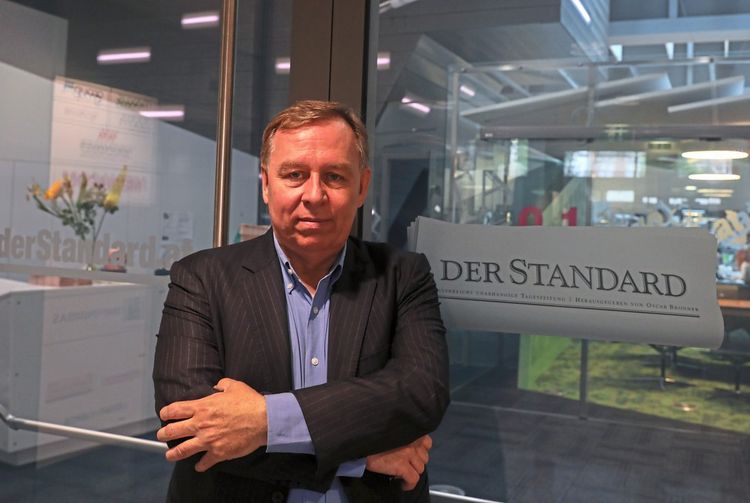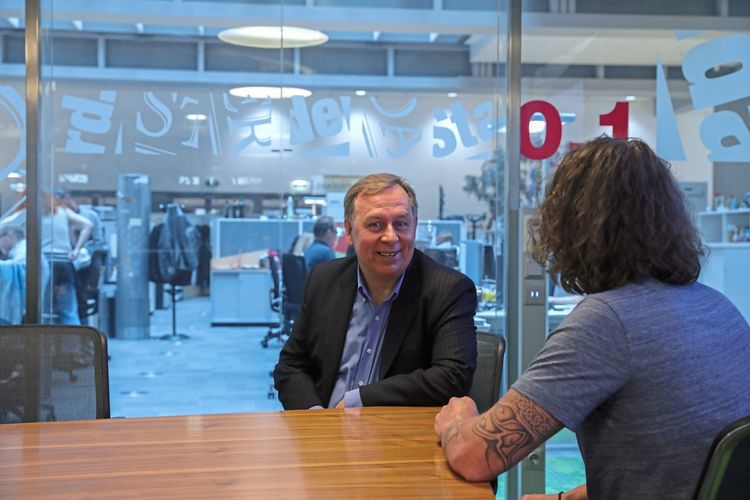For Robert Tibbo, there's life before and life after Edward Snowden. The Canadian lived in Hong Kong, where he has been a successful lawyer, since the late 1990s. In addition to his work as an attorney in the area of high finance, Tibbo has also made a name for himself as a human rights expert, and has represented numerous asylum-seekers in Hong Kong, building up trust among this marginalized group. But all that changed when he received a phone call in June 2013 asking him to take on NSA whistleblower Snowden as a client.
Instead of sitting in a penthouse in Hong Kong, Tibbo now finds himself in a rather plain, modestly sized home somewhere in Europe, his precise whereabouts known only to a select few. He maintains contact with the outside world via laptops and mobile phones that do not require a SIM card, and when he talks about his case, he puts the mobile phones in the freezer as a precaution against surveillance. He has become a wanted man; he constantly seems nervous and he is extremely suspicious. Now, he has turned to media organizations like the New York Times, Paris Match and DER STANDARD to draw attention to his situation.
"Too Many Coincidences"
The reason for Tibbo's angst is the multitude of would-be coincidences that have befallen him since 2016. He is convinced that someone is trying to "destroy" him "professionally and privately." He suspects the authorities in Hong Kong have mounted a concerted retaliatory action, "perhaps other governments as well, but that is very difficult to prove." He attributes it all to the work he has done on Snowden's behalf.
Observers like Canadian lawyer Pascal Paradis, a member of the nongovernmental organization Lawyers Without Borders (LWF), who have closely monitored Tibbo's case speak of "too many coincidences." Because ever since September 2016, when the circumstances surrounding Snowden's escape came to light in Hong Kong, the noose around Tibbo's neck has been getting tighter and tighter. The fact that the Hong Kong Bar Association has been attacking Tibbo since then is a circumstance Paradis describes as "worrying." The bar association informed him about two "anonymous complaints" from "large groups of disappointed lawyers."
"Disturbing" Course of Action
They accuse Tibbo of having damaged the profession as well as his clients through his work for Snowden. Meanwhile, the bar association has requested more information from Tibbo about his work on behalf of the whistleblower. Paradis describes the course of action as "disturbing." "After all," he says, "the relationship between lawyer and client is confidential."
Canadian lawyer John Cameron QC, a high-ranking member of the bar in Nova Scotia for many years who is familiar with Tibbo's case, has even stronger words. "As chairman of a bar, I would throw an anonymous complaint like that into the trash immediately," he says. It's hard to believe that there isn't any political design behind the actions, Cameron adds. "There are just too many coincidences."
The Hong Kong bar itself has rejected any criticism. Robert Pang, the association's deputy chairman, maintains that he is only aware of a single anonymous complaint against Tibbo. By chance, that complaint was submitted to the bar association on Sept. 9, 2016, which also happened to be the same day that Oliver Stone's docudrama "Snowden" opened in theaters, a film which also covers the whistleblower's dramatic escape. Pang does note, however, that there have been other complaints against Tibbo relating to his work for Snowden. The Canadian lawyer, though, knew nothing about them until now.
Targeting Refugees
But it's not only the bar association that has been taking conspicuous action against Tibbo since 2016. The "Snowden refugees," as a group of asylum-seekers who helped hide the whistleblower in Hong Kong in 2013 are called, have since been denied any form of government support and have generally been treated as if they were an organized group. Yet the only thing they have in common is that all of them are represented by Tibbo.

At the same time, officials overwhelmed the lawyer with work, asking him to immediately tend to more than 40 of his cases that had been in a bureaucratic holding pattern for years. Only to then file additional complaints about him with the bar that he hadn't processed the cases quickly enough.
Getting answers from the authorities in Hong Kong can be a challenging endeavor. If you manage to reach someone by phone, most are only willing to speak on the condition of confidentiality. And even then, the roles are not clear. Rather than answering questions, the authorities tend to ask them. The questions went as far as officials wanting to know Tibbo's current whereabouts, where the journalist was located, and which media were working on the story and with what intentions.
Faced with growing pressure from the authorities on him and his clients, Tibbo turned to a group of young Canadian lawyers in Montreal in 2016. They agreed to help him in his efforts to assist the "Snowden Seven" asylum-seekers and the aid organization "For the Refugees" was founded.
"Things Were Getting Weird"
Marc-André Séguin was one of the co-founders. A specialist in immigration and commercial law, Séguin says he has known Tibbo "for years." But he first heard about the story of Snowden and the refugees right before that information went public. "Things started getting weird" right after he agreed to help, he says.
Rather than providing assistance, the authorities expressed serious reservations in their dealings with the refugees and also Tibbo. "We started to worry. About the clients and about Robert," says Séguin. He adds that it is "disturbing" that a renowned Canadian lawyer could come under such pressure just for doing his job. "And what does it mean for asylum-seekers, who are barely given a voice anyway?" Séguin asks, continuing the thought.
In the summer of 2017, Séguin began sensing that his work on the issue had also brought him into the crosshairs of authorities in Hong Kong. "I traveled to the city unannounced with a colleague, but barely an hour after landing, we were being followed by two police officers in civilian clothing," the lawyer says. The situation, he says, was disturbing. "They even followed us right up to the roof of an apartment building," he says. After getting caught in the act, the police suddenly identified themselves and claimed they were looking for a "Chinese-looking man."
An Attempt to Facilitate Travel To Canada
Ultimately, it was a multitude of similar "coincidences" that made Séguin and his colleagues suspicious. To ensure the safety of the seven refugees, the lawyers filed asylum applications for them in Canada. "Because these people obviously aren't safe in Hong Kong," says Séguin. "Taking care of them here requires an enormous deal of effort. That's why we would have arranged everything for them in Canada, an apartment, work, school -- not a cent of taxpayer money would have been needed." He says that even though Canadian immigration law is very complicated, he still wonders why the seven refugees' applications aren't being processed more quickly.
Canadian Immigration Minister Ahmed Hussen, to be sure, initially promised to process the cases quickly. But he appears to have had a sudden change of heart in mid-2017. The official line now is that all applications will be handled fairly and equally, meaning a waiting period of around 52 months. It's time the refugees don't have. Officials in Hong Kong have since rejected all seven asylum requests, which was no surprise to the lawyers, given that Hong Kong grants asylum to fewer than 1 percent of all applicants.
Séguin also has clear words about the delay tactics being used on the Canadian side. "These people are in mortal danger," he says. If it takes too long for them to be allowed to leave Hong Kong, the fear is that they will simply disappear. Contacted for comment, the Canadian authorities did not provide an answer before this article went to the press.
Even as the lawyers fought for their clients, the other side tried to prevent them from doing so. The immigration authorities have repeatedly told Tibbo's clients that the lawyer was not working in their best interests, an accusation that Paradis sees as being exceptionally absurd. After all, Paradis says, "the relationship between Tibbo and his clients is exceptionally close and trusting." He says that in countless conversations with refugees whom Tibbo represents, no complaints had been made about the lawyer. "They love him," he says.
Arresting Witnesses
One of those is Vanessa Rodel, a Philippine asylum-seeker who allowed Snowden to hide at her place and whom Tibbo has represented since 2012. She warned Tibbo in the fall of 2017 that the Hong Kong police were looking for him. That search apparently stemmed from Tibbo's accusation that Hong Kong authorities in late 2016 had allowed officers with Sri Lanka's criminal police, notorious for torture, to search for the five Snowden refugees in Hong Kong that come from Sri Lanka. Rather than investigating, the Hong Kong police went after the witnesses.

One of the witnesses was Ranjith Keerti, who is originally from Sri Lanka and has been living in Hong Kong for over 20 years. The officials from his home country began searching for the Snowden refugees within Hong Kong's Sri Lankan community and Keerti knew one of the families -- and immediately warned them. But instead of interviewing Keerti as a witness, as Tibbo had demanded, Hong Kong police arrested Keerti, briefly detained him and questioned him exclusively about Snowden.
The same thing happened to some of Tibbo's other clients. They were ordered to share everything they knew about the whistleblower. Ultimately, the police went after Tibbo himself, accusing him of lying and inciting false testimony. That's when Tibbo knew it was time to leave town.
Fleeing with Protection
That impression is confirmed by Paradis of Lawyers Without Borders, who was in Hong Kong at the time. "The pressure on him continued to mount," he says, "and there was a certain danger." Tibbo was advised to leave immediately. Accompanied by Paradis and another LWF staff member, he hurriedly fled the city at the end of November 2017. Rodel accompanied her lawyer on the way to the airport. "The atmosphere was very tense," she recalls. "Two officials from the Canadian Consulate were present for protection, and one accompanied Robert all the way to the plane."
Rodel described it as a sad goodbye for her. Legal support for asylum-seekers isn't exactly a career springboard in Hong Kong, after all, which also explains why it is so hard to find lawyers specializing in this sector there. In that respect, Tibbo is an exception, says the young woman, who is trying to eke out an existence for herself and her 6-year-old daughter. Doing so is no easy task: All of her state support has been cut and asylum-seekers are legally prohibited from working in Hong Kong and can be penalized for doing so.

Still, the single parent says she doesn't regret having hidden Snowden, despite her precarious situation. "I'd do it again," she says, "because I'm proud of myself for helping the world's most wanted man." Rodel firmly rejects the idea that her lawyer Tibbo might have taken advantage of her good nature on behalf of his famous client. "Robert is a very good man who fights for us," she says.
Tibbo hasn't returned to Hong Kong since his involuntary departure at the end of November 2017. In the meantime, he has lost more than 90 percent of his clients due to his forced absence. He says he fears for their safety and feels powerless. He has hired London-based lawyer Geoffrey Robertson QC, who previously represented WikiLeaks founder Julian Assange, to represent him. Robertson points out that it is extremely dangerous when that kind of pressure is placed on lawyers. And he, too, suspects that the troubles Tibbo has encountered are the result of the work he did for Snowden: "The main charges are based on anonymous complaints and there is a concern about their motivation given that he acted for Edward Snowden. The Association must treat him fairly, give him every opportunity to defend himself and uphold his right to act for troublemakers like Mr. Snowden."
(Steffen Arora, 27.11.2018, Translator: Daryl Lindsey)